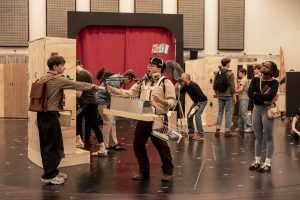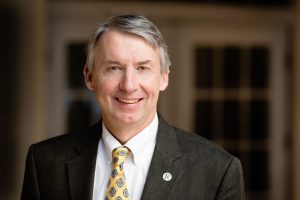Patrick Powers, dean of Rollins’ Knowles Chapel, recollects with irrevocable sorrow the image of the first plane hitting the World Trade Center. He was at home, about to leave for the morning.
His television was on, but the sound was muted and he first thought that the footage of thick black columns of smoke was a preview for a movie. Turning the sound on, the dean realized with both fear and horror what had just occurred. In his rush to Rollins, the second plane hit.
Nine years later, the memory is still vivid in his mind and he is concerned that the hatred is still just as vivid in the minds of others. Powers feels that Islam has been “more besieged in the past month than it was in the first month following the attacks.”
He questions the “incendiary” provocations of radicals from both the Muslim and Christian sides. As to the “nutty” priest in northern Florida who had plans to burn 200 English translations of the Quarn on Saturday; the dean said that he is “fearful for him” but that he also sees it as his duty to pray for and forgive him.
Powers said last Thursday that he wanted the 9/11 memorial service held Sept. 10 to be foremost about remembering and giving tribute to those who lost their lives in the tragedy. Secondly, he wanted the experience to give comfort to those who were affected by the attacks.
Finally, Powers wished to pray for those on all sides of the confrontation, hoping that those who “want to reopen wounds” might “come to their senses.” Although he did not wish for the service to be a political event, he wanted students and staff at Rollins to reach out to one another in friendship as a “gesture of defiance.”
Those present did just that during the ceremony, held at noon on the steps of the chapel. The group was gathered closely and a sense of friendship was evident. That apparent goodwill mirrored the message that Dean Powers conveyed in his speech to the students and staff assembled: a message of peace and alliance.
He reminded the crowd that both Islam and Christianity are predominantly peaceful religions and insisted that those at Rollins and throughout the country “disavow contention, animosity, bigotry and violence.”
One of those gathered on the steps was Justin Stone of Information Technology. Stone was on his way to volunteer at a food bank when he heard of the attacks. Just like Dean Powers, he remembers the moment as being surreal.
Now, Stone understands the very real motives and details of the day and sees the strike as akin to Pearl Harbor, a “direct and cowardly attack” on the nation. He thinks it is important that we always remember the victims and heroes of that day and be reminded of “what’s really important.”
As the mournful sound of taps—a bugle piece played at military memorials—dissipated over their heads, and the Dean’s words sett led in their minds, the crowd was undoubtedly dwelling on the memory of that terrifying day nine years ago and inwardly questioning what exactly is most important to them.







Be First to Comment